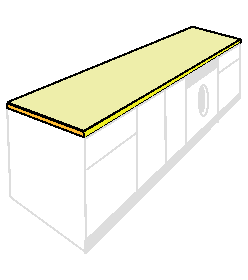Kitchen Worktops: Difference between revisions
From DT Online
Created Article |
mNo edit summary |
||
| Line 3: | Line 3: | ||
These are usually made from plastic laminate coated chipboard. They are bought in lengths and cut to fit over base units and spaces. The leading edges are sometimes formed (rounded) to remove sharp corners for safety reasons. If this process is completed after the laminate has been made it is known as [https://en.wikipedia.org/wiki/Countertop#Post-formed_plastic_laminate '''post-forming''']. | These are usually made from plastic laminate coated chipboard. They are bought in lengths and cut to fit over base units and spaces. The leading edges are sometimes formed (rounded) to remove sharp corners for safety reasons. If this process is completed after the laminate has been made it is known as [https://en.wikipedia.org/wiki/Countertop#Post-formed_plastic_laminate '''post-forming''']. | ||
Revision as of 12:07, 3 June 2015

These are usually made from plastic laminate coated chipboard. They are bought in lengths and cut to fit over base units and spaces. The leading edges are sometimes formed (rounded) to remove sharp corners for safety reasons. If this process is completed after the laminate has been made it is known as post-forming.
The plastics laminate comprises a layer of melamine formaldehide, a layer of paper containing the printed design and then a layer of phenol formaldehyde. Melamine is clear and resistant to scratching. Both plastics used are thermosetting and resistant to heat.